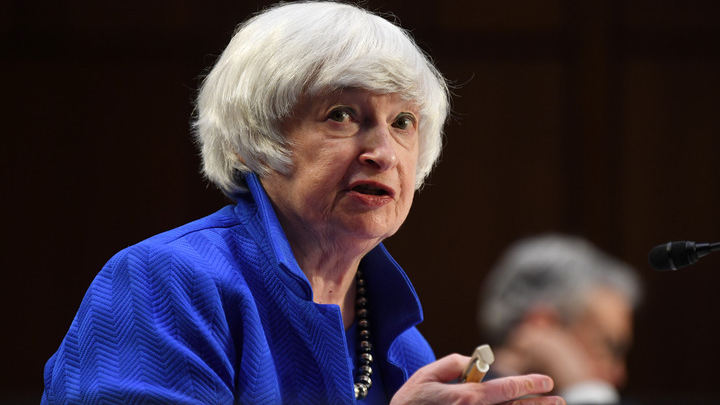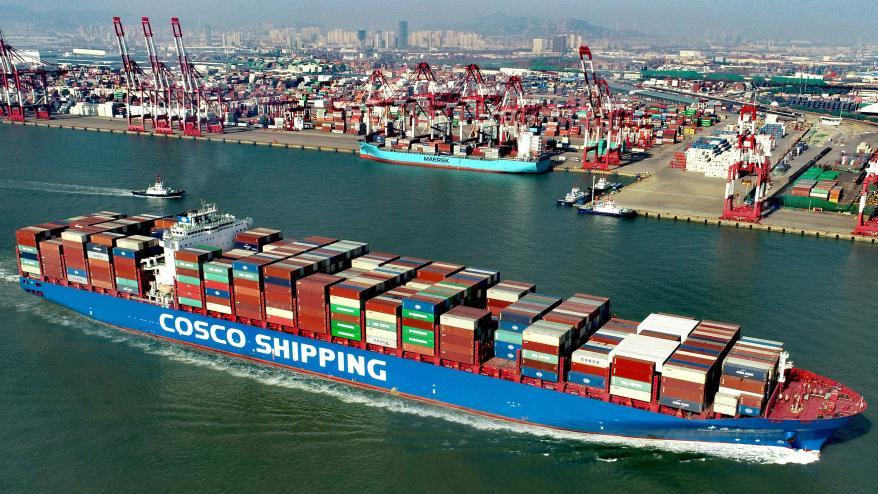
U.S. Treasury Secretary Janet Yellen. /Xinhua
U.S. Treasury Secretary Janet Yellen. /Xinhua
Editor's note: Liu Chunsheng, a special commentator on current affairs for CGTN, is an associate professor at the Beijing-based Central University of Finance and Economics. The article reflects the author's opinions, and not necessarily the views of CGTN.
U.S. Treasury Secretary Janet Yellen will start her visit to China, which has garnered significant attention and raised hopes for a potential breakthrough in the strained relationship between the two economic giants. However, given the prevailing trade disputes and geopolitical tensions, it is crucial to manage expectations and recognize the challenges that may impede substantial progress during Yellen's visit. While the visit serves as an opportunity for dialogue and cooperation, the underlying complexities indicate that achieving a breakthrough in bilateral relations is difficult.
In recent years, the United States has exerted pressure on China in various fields such as trade, investment, military, and technology, attempting to contain China's development. The U.S. has put forward ideas of decoupling and cutting ties, as well as promoting de-Chinalization. Additionally, the United States has challenged China's bottom line on issues including the South China Sea and Taiwan, leading to a continuous deterioration in bilateral relations.
A significant concern overshadowing U.S.-China relations is the enduring trade dispute. The tariffs that President Donald Trump imposed on Chinese goods are still in effect. The White House has been working to restrict China's access to critical technology such as semiconductors. While Secretary Yellen has acknowledged these concerns, resolving the trade issues requires sustained efforts and an in-depth understanding of the complex trade dynamics. Issues such as tariffs and market access remain contentious, necessitating a more comprehensive and long-term approach that cannot be resolved through a single visit.

A cargo ship pulling out at Qianwan Container Terminal in Qingdao, east China's Shandong Province, February 19, 2021. /Xinhua
A cargo ship pulling out at Qianwan Container Terminal in Qingdao, east China's Shandong Province, February 19, 2021. /Xinhua
The geopolitical landscape presents another major challenge to the improvement of U.S.-China relations. Heightened tensions over issues such as the South China Sea and Taiwan further complicate the relationship. Secretary Yellen's visit takes place against this backdrop, where geopolitical factors significantly influence economic cooperation. Although the primary focus of the visit is on economic matters, the presence of geopolitical tensions limits the potential for breakthroughs and necessitates careful navigation to prevent further strain on the relationship.
Mutual trust is a crucial aspect that underpins the relationship between the U.S. and China. In recent years, both countries have witnessed a decline in mutual trust, with increasing suspicions and lack of confidence exacerbating the strained ties. Trade wars and technology restrictions have only served to deepen the mistrust. Rebuilding trust requires consistent efforts and a conducive environment for open dialogue, as mistrust remains a significant barrier to achieving meaningful progress. It is essential for both sides to work towards establishing stable mechanisms that foster trust and mutual understanding.
The U.S.-China relationship is characterized by a complex interplay of competition and cooperation. Both nations compete in various domains, including technology, and economy. While competition can drive innovation and growth, it also poses challenges to cooperation and compromises the potential for breakthroughs in bilateral relations. Striking a delicate balance between competition and cooperation is necessary to address mutual concerns, foster a more constructive relationship, and identify areas of shared interest where collaboration can flourish.
While Secretary Yellen's visit to China has generated anticipation, it is crucial to temper expectations for a breakthrough improvement in bilateral relations. The persistence of trade disputes, geopolitical challenges, mutual mistrust, and the competitive dynamics between the U.S. and China pose significant obstacles.
However, the visit presents an opportunity for meaningful dialogue, understanding, and incremental progress in areas of shared interest. On June 13, Yellen spoke out in opposition to the decoupling between China and the United States at a hearing of the House Financial Institutions Committee, stating that if the United States completely cut off economic relations with China, it would be a disaster. Sustained communication, constructive engagement, and a long-term commitment to addressing the underlying issues will be essential in building a more stable and cooperative relationship between the U.S. and China.
(If you want to contribute and have specific expertise, please contact us at opinions@cgtn.com. Follow @thouse_opinions on Twitter to discover the latest commentaries in the CGTN Opinion Section.)